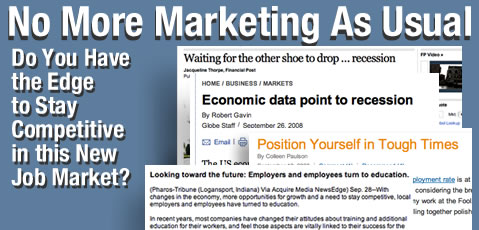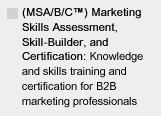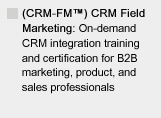BMI Training and Certification, The Current Economic Crisis, and You
more >>
MAKE SURE YOU CONTINUE TO RECEIVE EACH ISSUE OF TUESDAY MARKETING NOTES—CLICK HERE TO RENEW YOUR FREE SUBSCRIPTION



How to Survive
The Great Marketing Wipeout of 2009:
When the Budget Axe Falls, It’s Time to Get Real (Part 1)
by Eric Gagnon
As the major downturn in the stock market and the lockup in our financial system will have their impact on company B2B marketing budgets, these cutbacks won’t be happening to ad budgets alone. In addition to headcount reductions which occur in every recession, companies will look to all of their departments, to identify those who are pulling the wagon, and those sitting in it. As a marketer in your client, or an agency or consultant working for your client, you obviously want to be in the first group, not the second.
Unfortunately, marketing—and marketing staff—are often one of the first areas cut, because in good times when sales are easy, companies tend to keep rolling with the status quo, and management tends to overlook the disconnect that often occurs between marketing and sales. This happens when the company’s sales team believes its marketing department isn’t serving or supporting their efforts to increase sales, either by generating leads or by offering effective field marketing and sales support.
But in the inevitable downturn that will come as a result of this current economic crisis, those of us in marketing who think things will be the same way they have been will be in for a rude surprise. This status-quo thinking, and the role many of us believe we serve as marketing professionals in our companies, and for our clients, will soon come under harsh scrutiny.
If you’re a younger person in our field, born after 1980, you don’t know what a real recession is like, but you’re going to find out. Now is the time to wake up to the way things are going to be, assess how you’re doing your job, and make the changes you need to both your program, and your personal approach to your marketing profession, to increase your value and worth to your company, and survive this recession, which is going to be painful and deep.
What follows are guidelines for identifying the danger signs of unaccountable, unsustainable marketing programs in this new environment, and steps you can take to save your program and save your marketing career. If you’re with an ad agency or a consultant, much of this applies to dealing with your B2B accounts from here on in as well.
Why Most of What You’ve Been Told About B2B Marketing is Wrong Today
The first step to keeping your job (or your client) in this new environment is to adjust your mindset and get back to basics. As B2B marketers, this means ridding ourselves of the delusion that we are somehow the keepers of the magical mystery knowledge that controls our markets, through control of our company’s “brand.”
As Geoffrey James writes in his Sales Machine blog, marketers have gotten away for too long with claiming credit for a company’s success by their supposed control of ”branding,” when most of a company’s brand perception is actually created and controlled through other factors, such as product quality, engineering, customer service, and company reputation.
As Geoffrey writes:
[Branding is] a marketing-centric way of looking at business that’s specifically designed to fold everything that happens under the aegis of marketing.
It’s a vision of “branding” that bundles trivial things (mostly controlled by Marketing) with important things (mostly controlled by other groups) and then lets marketing take credit for the whole kaboodle.
The concept of “branding” is, in short, simply a power play that allows Marketing to pretend that they’re “driving” the business. It’s a concept that channels budget money toward Marketing, where it is usually wasted on egregious nonsense.
For too long, too many of us in marketing who support "branding" initiatives in small to mid-sized companies in B2B have been taking credit for the work of others, such as engineering, sales, and customer support, whose roles have been far more instrumental in building the “brand perception” of our companies, through their work in developing superior products, providing great customer service, and bolstering their company’s reputation. As marketers, it’s time for us to get back to our job, which is to generate leads for sales, help sales to convert more of these leads to customers, faster, and to provide the field support necessary to make the sales process more productive and more efficient.
Next year, in a lot of companies, the arrogant and clueless marketer or agency types who still talk about “building the brand,” without getting real about engaging in tangible activities that help their struggling companies keep their sales on track and grow their businesses—none of which have anything to do with “branding”—will find themselves replaced by those who have, or who can develop, the right mindset for these new times.
Nuke Your Marketing Program Before Someone Does it For You
Let me say something that will shock you: If your marketing plan is like most B2B marketing programs, in this recession you’d be better off slashing it down to zero and starting over.
That’s right. Cut it all down, burn it out, and start it up again from scratch. This means your creative, your deliverables, your plan, your media schedule, your ad agency, and maybe even your outside vendors.
Zero everything out, target anything that isn’t currently generating measurable sales leads for your company’s sales team, and eliminate it. Forget about the branding you thought you were building by running all those ads that couldn’t be tracked back to sales generated or new business won. If it’s not producing, get rid of it, now.
For marketers in many B2B companies, if they were being honest with themselves, this would mean gutting at least half of their entire marketing budget for ads, mailings, irrelevant collateral, wasted PR firm retainers, and stupid, non-performing events like charity poker tournaments.
Yea, I know you haven’t read this before. Everyone else who’s writing about marketing in our current economic state is telling you to defend your ad budget at its current levels (or, ramp it up), so you can rake in all that new business you’ll get from all those other chumps who cut their ad budgets instead of you.
Because many of the people who write this stuff for marketing publications either: A.) never actually ran their own business, or a marketing program, or sold anything, or lived through a deep recession, or B.) work for trade publications where getting you to keep buying ads helps them, regardless how it helps you—might I humbly suggest they either don’t know what they’re talking about, or what they’re telling you isn’t serving your best interests?
If, even during good times, when 80% of marketing executives say their marketing programs can’t be measured for their contribution to sales, or if sales reps spend, on average, 40-60 hours each month re-doing their company’s marketing deliverables to make them relevant for their selling tasks, why would anyone think any of this should continue even when the economy goes south?
The truth is, it can’t, and it won’t. Your VP of finance knows how to measure ROI, and if you can’t show him how your marketing program measures up by this standard, your program’s going to get cut, along with your marketing department’s headcount, and maybe you. Your job survival in marketing depends on proving to yourself and your management that a significant share of your time, effort, and resources are being applied to your primary task of running marketing programs that make a tangible, measurable contribution to your company’s sales growth. And this process begins by getting ahead of the problem and cutting the non-productive areas of your marketing plan before someone else in your company does it for you.
What to Cut, and Why: Slashing the Non-Productive Parts of Your Marketing Plan
I’ve worked with companies in sales turnaround situations, or in new venture start-ups, who’ve burned through most of their marketing budgets or investor money, hit the wall, and need to get real about executing effective marketing programs that sell their products.
In good economies and bad, this often means working with a company that’s been going through their own economic depression, either through events, bad luck, or, most often, sticking too long with a bloated, stupid, ineffective, or poorly executed marketing program.
Based on this experience, below are the tell-tale signs of problem marketing activities and attitudes that have turned too many a company’s marketing programs into big, expensive, smoking holes in the ground:
• Running costly “brand reinforcement” print advertising campaigns;
• Failure to test any lead generation marketing activity before a full rollout;
• Failing to establish measurement methods and benchmarks for a marketing activity;
• Failure to get marketing involved in lead follow-up on sales leads generated;
• Marketers who look down on salespeople;
• Failure to realize the value of mailing lists, and relying exclusively on mailing list recommendations from list brokers;
• Hiring a big, local, well-known consumer ad agency to work on your B2B account;
• Failure to capitalize on selling opportunities, due to poor, late, or non-existent marketing execution;
• Hiring any PR firm on a monthly retainer;
• Producing any corporate video that costs more than $10K;
• Failure by marketing to support high-level sales presentations and other major new business development and growth opportunities;
• Anyone on your marketing team who can’t write a serviceable ad, sales letter, or other marketing deliverable for any marketing project;
• Anyone on your marketing team who wastes time on measurement not related to leads or linked to sales, such as trying to calculate the value of your company’s “brand equity;”
• Spending money on over-the-top, high production-value marketing collateral, like 3-D foldout brochures or other materials produced to win industry advertising competitions;
• Sending out expensive gifts like bottles of wine, candy, gadgets, etc. in gimmicky mailings to influence key prospects (commercial bribery isn’t marketing)
What every one of these signs above have in common is they are signs of marketing activities that either don’t lead to sales leads generated or new business closed, or have nothing to do with marketing’s real mission in B2B: To generate sales leads and new business, and working with sales to help them turn these leads into paying customers.
In a down economy, focusing your energies on these critical core goals, and cutting out every non-performing project that can’t be linked to increasing sales lead generation, lead development, or sales cost reduction, is your first step toward better job security with your company, or securing your account position with a client.
During recessions, as companies restructure or leave the scene, new opportunities for business growth reveal themselves, setting the stage for the next recovery. But to capitalize on those opportunities, you have to be around to see them.
Next week, we will describe how to restructure your marketing program, and your approach to B2B marketing, to make yourself indispensable to your company or your client . . .
Comments? Questions? Send them to me at: eric@businessmarketinginstitute.com
Eric Gagnon (eric@realmarkets.net), a director with the Business Marketing Institute, is author of The Marketing Manager’s Handbook and The CRM Field Marketing Handbook, and president of GAA ( http://www.realmarkets.net ), a marketing, sales turnaround, and product development consulting firm.








